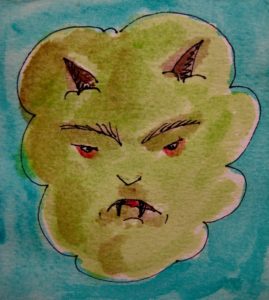
– Art by Jan Ketchel © 2018
“I woke up in such a mood; I can’t seem to shake it.”
What is this heavy feeling state that mysteriously envelops us like a fog as it thwarts our familiar energetic sense of self. A mood hardly seems part of our typical ego consciousness. It seems to derive from elsewhere in the vastness of our psyche, having gained enough momentum to overtake and color our state of mind and energy for the day.
A mood is the emotional expression of an other part of the self, a sibling of the ego, that typically resides in our shadow, the part of us that is also “us” but resides in the dark, outside our conscious light-bearing ego self. A mood is a concretely experienced example of a separate and distinct part of ourselves that impacts our consciousness, as well as our attitude, as we approach our daily lives.
Jung originally coined his psychological approach “complex psychology” when he discovered the existence of other characters in the psyche interfering with the conscious ego’s ability to respond to certain words presented in a word association test. This was expressed through delays in reaction time, as well as through physiological indicators of emotional distress. For Jung this was clear evidence of what he called “feeling toned complexes” or sub-personalities that coexist in the background or unconscious part of the psyche.
A mood can be understood as a form of communication to ego consciousness from an inner complex or sub-personality that expresses a powerful negative reaction or attitude toward something present or emerging in life. Given its debilitating impact upon the will of the ego, the mood may render the ego deflated or depressed. Often this can lead to an immobilized or compromised moody state.
The emotional tension generated within the individual by the mood frequently seeks relief via blaming someone outside the self as the problem. This of course can lead to endless misunderstandings and bickering as the scapegoated other reacts to questionable accusations. Unfortunately, the defensive need to relieve tension within the self often blinds a person to such distorted projections.
Ultimately, the sub-personality or complex behind a mood must be owned and reckoned with directly by the ego through an inner process of reflection and negotiation. The ego must suspend judgement toward the troublesome complex if it hopes to engage it in a reconciliatory process. Although the ego must endure a mood, it must also establish that it remains in control of all actions taken. Nonetheless, it must be willing to let the mood have its own voice too, that is, allow it to express its point of view, the reason for its mood.
The ego must be careful not to decide it automatically knows the reason for the mood, it must consult the mood directly. As we sit quietly with the mood we seek to have it communicate its point of view directly. We can do this through a process of amplification, by acknowledging the feeling state of the mood and asking for more information. Perhaps at this point an image or thought spontaneously comes into mind.
Perhaps we see a familiar person’s face in our mind’s eye. Perhaps we hear them saying something. We can listen and give attention to what they might say. If it’s just an image, no words, we can stay with the image and see what associations about the person come to mind. If we write down our associations we can then feel our way through them to see what associations feel more energized in this moment. In effect, we are building a communication bridge with the mood that gradually fills out its message.
Perhaps it becomes clear that our ego has felt obliged to accommodate a plan with another person because it doesn’t want to disappoint them. The mood becomes recognized as a shadow complex that holds the truth that we don’t want to do something. Its mood is an attempt to subvert action and have the ego assert itself.
The ego is now in a position to acknowledge the truth of the mood and the need to become more assertive with its true feelings. The ego can then validate the shadow complex and pledge to move gradually toward greater self assertion. This might set the stage for a fairly quick lifting of the mood. Sometimes it can be that simple, at other times far more complex.
The key to the resolution process is the acknowledgement by the ego of the autonomy and right to exist of the complex itself. Giving attention to the complex warms it toward the ego, but it must realize that the ego is in charge of all final decisions of action.
Treating a mood as an invitation to a dialogue shifts the focus toward positive collaboration. As difficult as that process may be, it stands to advance us toward inner unity and healing.
Move over Freud! Perhaps communing with moods is an even more efficient royal road to the unconscious, though of course dreams are always welcome!
Mood lifted, blog written,
Chuck




